#The Trojan Women
Explore tagged Tumblr posts
Text

You were lying to me, when you'd jump on my bed and say "When you die, grandma, I will cut my hair for you, and bring all my friends to sing at your grave."
3K notes
·
View notes
Text

#other plays that center Trojans after the war but still#the Trojan Women (1971) literally broke me#Andromache babygirl I’m sorry ppl keep excusing and watering down Odysseus’s actions#and that’s always why it’s fuck Astyanax lives aus where he is adopted by Odyseus#Athena and Hera aren’t off the hook either but at least Athena expressed some remorse and regret#greek mythology#ancient greek mythology#greek pantheon#Odysseus#Andromache#Trojan war#the trojan war#the trojan women#Troy#sack of Troy#astyanax
120 notes
·
View notes
Text
I keep thinking about euripides' play 'women of troy' and epic the musical. odysseus, planning the trojan horse, leaving the women and children alive, being forced to kill hector's son, seeing helen and feeling a sense of overwhelming... exhaustion. this whole war fought for her, and all helen says is 'the gods made me do it'. and hecabe screams and mourns and pleads for helen to be punished even as she's being taken away as a slave and. odysseus can't help but see penelope in hecabe and helen and andromache and cassandra. and he just. he didn't start this war, he wanted no part in it, but he has prisoners on his ship and now he's going home with them. (they don't make it, of course. none of them do. except odysseus.)
#I just like#yeah#epic the musical#the odyssey#odysseus#women of troy#the trojan women#euripides#the trojan war#distant screaming screams into the void
62 notes
·
View notes
Text
I don't understand where the idea that Cassandra was treated badly by her family comes from? I've seen many retellings and fanfiction like that, maybe it's one specific source I don't know?
Here's a scene in Euripides' tragedy Trojan Women:

Context: Cassandra came out dancing with two torches, items used during wedding cerimonies (but also funerals), and told the other women that her "marriage" with Agamemnon would have brought ruin to him and his house (as well as Cassandra's death, the same torches symbolism is present in Iphigenia in Aulis).
And Hecuba is so gentle with her, so worried about her fate and her well-being. And it's not just this one tragedy, in Euripides' Hecuba her mother is still worried about her.
Cassandra is loved, her family loves her. And if they were still alive, they would have mourned her as well. Cassandra mourned her family and city for a long time, living with impending doom looming above her. She deserves that much, no need to make her story more tragic than what already is.
#cassandra#cassandra of troy#hecuba#greek myth#the iliad#the trojan women#euripides#greek tragedy#epic cycle
17 notes
·
View notes
Text
I’m a woman written by a man, but the man was Euripides
#greek tragedy#medea#electra#the trojan women#Iphigenia in aulis#euripides#Andromache#orestes#tragic heroine#theatre#a woman damned by her own choices
84 notes
·
View notes
Text
read the trojan women by euripides. i'm sad now 👍
don't have a lot of academic thoughts since i just read it own my own but i thought the way it engaged with a sort of…intertexuality, is that the right word? was interesting. menelaus says that he'll kill helen but anyone who's read the odyssey knows that she lives, cassandra correctly predicting the events of the oresteia even even though everyone else thinks she's mad, etc. also i thought hecuba and helen's argument about whether helen was a traitor or a victim was interesting.
#the trojan women#lulu speaks#lulu reads#lulu reads the trojan women#mythology#greek mythology#lulu talks mythology#classics
16 notes
·
View notes
Text
I just watched a stunning performance of the trojan women and the amount of visceral rage I felt at every injustice is almost unmatched to anything I’ve ever felt before
#not to be a misandrist but I think we should kill all men#that fucking meme was right I do want to beat odysseus and the rest of the achaean men to death#NO ONE IS HAPPY IN THAT PLAY#I KNOW ITS A TRAGEDY BUT FUCK DUDE CUT ME SOME SLACK 😭#the way all the kings voted to KILL HELEN?????#girl WHAT WERE YOU FIGHTING FOR FOR TEN YEARS?????#(lets be honest we all know that war was about more than helen but ffs)#the hardest parts were andromache being told that astyanax is to be killed and cassandra’s beautiful monologue where she calls polyxena-#-lucky for being killed instead of enslaved#just#terrible all around#but I loved it tho#the trojan women#euripides#greek tragedy#tagamemnon
12 notes
·
View notes
Text
I hope Helen and Cassandra scissored.
#I’d love that for them#sorry there’s poetic justic in it#helen of troy#cassandra of troy#the trojan women#the iliad#tagamemnon#greek myth#greek mythology#the trojan war
97 notes
·
View notes
Text

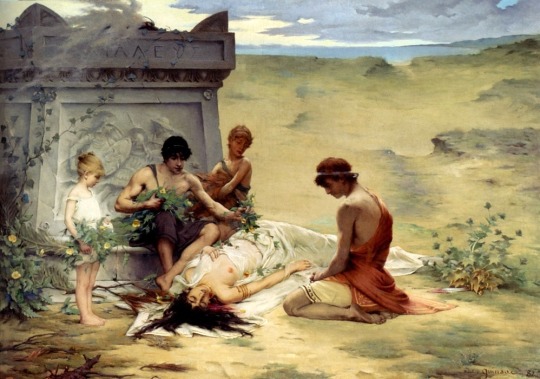

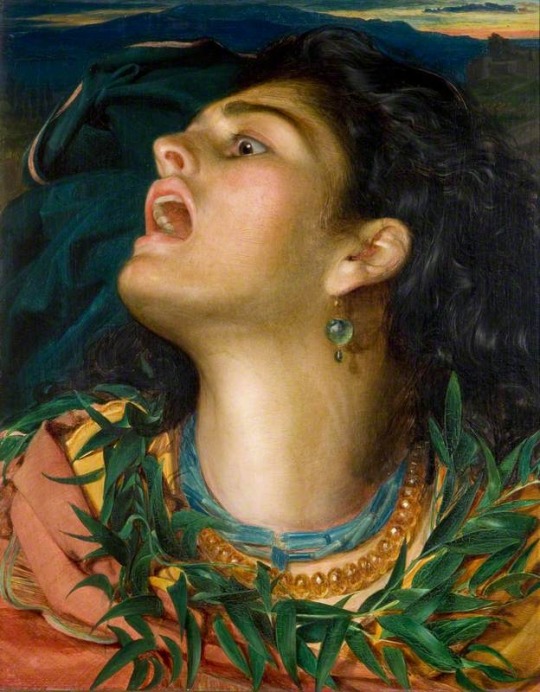

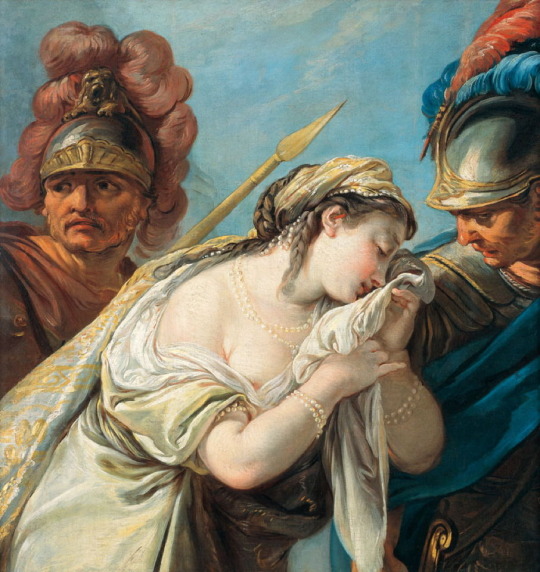

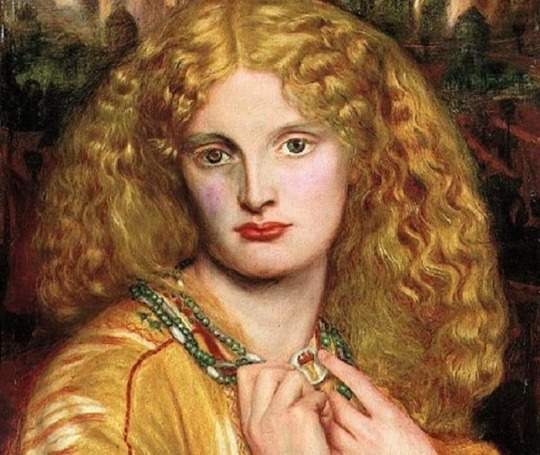

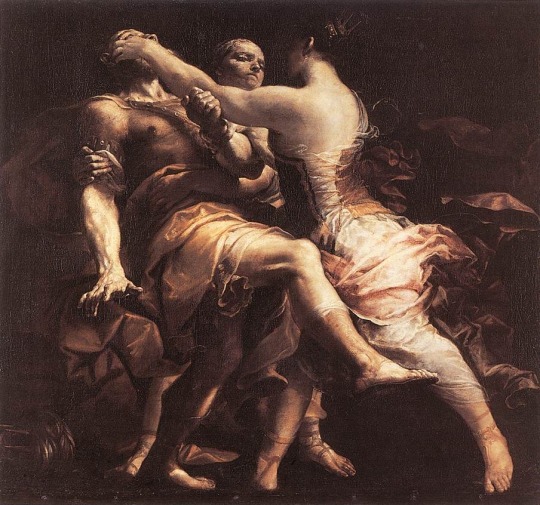
- just a girl x the women of the trojan war
#absolutely obsessed with Florence’s cover#no doubt#just a girl#florence + the machine#the Trojan women#trojan women#polyxena#helen of troy#Cassandra#Cassandra of Troy#Hecuba#briseis#art#pre raphaelite#lyrics#web weaving
259 notes
·
View notes
Text
i think one of the things that makes anne carson and rosanna bruno's the trojan women: a comic so powerful is the way the dialogue is drawn.
it's full-page panels with interweaving dialogue boxes that you have to carefully track to be able to know who's speaking. the voices blend together, especially when it's hecuba and andromache talking. when we lose track of which dialogue belongs to who, we are reminded that they could be anyone who has been affected by war— they are anyone's grieving relative, they are anyone who has watched their entire life be destroyed before their eyes. really gets the point across that this interpretation of the play is meant as a timeless representation of the way war affects people.
#the trojan women#hecuba#andromache#anne carson#the fact that this was published in 2021 also makes it feel More Relevant than the anne carson work i've read
21 notes
·
View notes
Text
5
A silver tongue will carve a golden path; beneath its gleam, the shadows gather, waiting.
The clearing of Paris’ throat silenced the crowd before him, my hands wrestling against themselves, with the comfort of clenching on to the pale green linen chiton gathered into my lap. Subtle embroidery in the shape of olive branches perched along the hem, my sleeves pinned with bronze fibulae shaped like lotus flowers. A dark brown braided leather belt interwoven with tiny laurel leaves made of bronze clung to my waist, a soft beige himation with a woven floral border, was draped over one of my shoulders and fastened with a decorative pin shaped like a sunburst, and simple sandals with straps decorated in small bronze beads laced up my legs. A necklace of freshwater pearls kissed my neck lightly, earrings shaped like doves, a thin golden and jewel encrusted anklet, with my long unruly curls pulled and tucked back into a low knot, small sprigs of fresh laurel woven in and stray curls wisped around my face.
My beautiful face, with my eyes shot bloodred, under them as deep purple as the wine that flowed freely tonight before the servants and slaves diluted it dutifully. Long, red stretches of scratches down the side of my cheek and neck, anything to escape what I saw when looked upon. Blood dried and caked under my brittle and breaking nails.
My fingers remain intertwined and clenched against each other, white and red anger bursting forth through them, hot to the touch, building with pressure. My nails dug into my skin instead, breaking and cracking angrily with the pressure applied to them.
"My honored family, noble kin, and cherished people of Troy,” the prince used his prince’s voice. Just a smaller, squeakier version of my father’s king’s voice. Commanding, but never stronger than the man who granted him the luxury of joining a crumbling family. “Tonight, I stand before you, not as the prince I was destined to be,” my fingernails dug further into my skin until bright drops of crimson blood appeared beneath them, “but as a son of this great city, humbled by its resilience and beauty. Long have I wandered from the walls of Troy, seeking to understand the world beyond, only to find that my heart has always belonged here, with you.” Paris lifted his goblet and raised it lovingly towards our father, his other hand placed warmly on his chest, who sat with his face swelling and reddening with pride. Not only did he have an honorable and formidable and fear striking son, now he had two. He swallowed his wine as quickly as his throat would allow him, drinking in the expanse of the strong and formidable youth in front of him as gratefully as the wine that fell his lips.
“Through hardships and exile, the Gods have guided my steps back to this place, to these halls where the songs of our ancestors echo still. I owe my life to their mercy and to the love of my father, King Priam, who has opened his arms to me once more. To you, Father, and to my brothers and sisters, I pledge my loyalty anew.” He turned to us now, his sisters and mother seated at the heart of the movement, raising his glass towards us. A wolf would not be welcome to the den if it could not make nice with the existing members of the pack. The light from the oil lamps danced across his face, twisting his seemingly sincere smile into something sinister. It flickered for only a moment, and glancing upon those who were seated around me no one else had been at the right angle to catch the play of the light as I had.
“But Troy is not merely a city of walls and warriors; it is a beacon of honor and justice. I am reminded of this truth now more than ever. For across the seas lies a kingdom where I have heard tales of beauty, wisdom, and diplomacy—a kingdom that stands as a kindred spirit to our own. Sparta, a land whose queen shines with a light as radiant as the dawn.” My chest tightens painfully, ripping and twisting my rib cage into a large bow to plop atop as the marker of a present.
A small princess, jumbles of blonde curls atop her head and fluttering around her. Laughing, kicking sand on the beaches of Sparta. Collecting seashells, comparing them with her sister. Of course, they began to bicker over the prospect of whose was prettiest, for they surely could not bicker over who was the prettiest, for the mess of blonde hair and tanned skin and freckle kissed bridge of the nose would be of no contest. A small fragile princess, ripped from her home and hidden away in a tower. For when you are as pretty as this princess, you are simply a prize to be won. Her brothers could not afford such hostilities to be thought appropriate to their family, and they stole their princess back. To be conquered. To be theirs. Never yours. Never your own. Princesses are smarter than to have such a thought. But they hide behind prettied lashes and golden gowns and then they are but a prize to be won.
“I propose, dear family, that we strengthen the bonds of peace and prosperity between our peoples. I will sail to Sparta as Troy’s humble envoy, bearing gifts and goodwill, to forge an alliance worthy of the Gods' blessing. This journey is not for my glory but for the enduring greatness of Troy.” The gatherers erupted into hoots and howls once more, the wild child sent to play Prince. They wished nothing more than to set Paris and his large snapping jaw loose unto the innocents.
The sea will swallow the walls.
My lips part, opening to speak, but instead they hitch inside my throat and make it hard for me to breathe. I gasp lightly for air, my fingers finding their way to my throat and gently grasping at it, attempting to open it in whatever way necessary to get my thoughts out. My throat closes around them, swallowing them and pushing them back down into my tumbling and rolling stomach.
“May we always act with courage and wisdom, and may the Gods favor this endeavor as a path toward harmony and strength. Tonight, let us raise our cups not just to my return, but to the bright future that I believe awaits us all.” Paris raises his cup, those seated at the table with him raising theirs as well. Surely, the rest of the hall followed suit, and my shaky hands grasped at the goblet in front of me. The Gods will laugh at us tonight. How eagerly they drink his honeyed words.
“To Troy, to family, and to the Gods who guide us!" and he drank. I flinch at the eruptions of howls, hoots, and whatnot that filled the hall around me, thick into the air, the stench of wine permeating through the thickest of cloths. The sound is deafening, ringing in my ears begging to be heard continuously, terrified that when the sound faded out that the only remnant would be the hope that the Gods could forgive us. The roar of an unseen beast. I mimic the motion of my sisters seated with me, and my brothers at the table seated with Paris, and raise my goblet to my lips. The wine seers and stings my tongue, frothing and bubbling and choking me with acid the whole way down my throat.
#greek myth retellings#greek mythology#greek gods#greek myth#apollo#cassandra of troy#helen of troy#helen of sparta#trojan war#paris of troy#the iliad#the trojan war#the trojan horse#the trojan women#fiction#indie author#creative writing#king priam#queen hecuba#hector of troy
4 notes
·
View notes
Text
I got the amazingest Yuletide gift ever, you guys. You may need an Ao3 account to read it.
2 notes
·
View notes
Text

Sometimes, Helen would go into the inner room even before I left and then I’d hear the chattering of the loom, the rattle as the shuttle flew to and fro. There was a legend—it tells you everything, really—that whenever Helen cut a thread in her weaving, a man died on the battlefield. She was responsible for every death. And then, one day, she showed me her work. I’ve known some great weavers in my life, including some of the women in the camp. The seven girls Achilles captured when he took Lesbos—they were brilliant, no other word for it, they were brilliant. But even they weren’t as good as Helen. I wandered round the room looking at the tapestries while Helen sat at the loom and sipped her wine. Half a dozen huge battle scenes covered the walls, a sequence that taken together told the whole story of the war so far. Hand-to-hand combat, men decapitated, gutted, skewered, filleted, disembowelled; and, riding high above the carnage in their glittering chariots, the kings: Menelaus, Agamemnon, Odysseus, Diomedes, Idomeneo, Ajax, Nestor.
I knew Menelaus had been her husband, before she ran away with Paris, but her voice didn’t change when she said his name. Did she point to Achilles that day? I think she must’ve done, but I really don’t remember. The Trojans were there too, of course, Priam looking down from the battlements, and below him, on the battlefield, his eldest son, Hector, defending the gates. No Paris, though. Paris seemed to be fighting the war from his bed. On the rare occasions I saw them together, it was obvious even to a child that Helen preferred Hector to Paris, whom I think she’d grown to despise. His reluctance to go anywhere near the battlefield was notorious, as was Hector’s contempt for his brother’s cowardice. When I’d finished walking round the tapestries, I went round again because I wanted to check something I didn’t understand.
“She’s not there,” I said to my sister that night after dinner. “She’s not in the tapestries. Priam’s there—but she isn’t.”
“No, well, of course she isn’t. She won’t know where to put herself till she knows who’s won.”
#perioddramaedit#lyrics#history#lana del rey#helen of sparta#helen of troy#the silence of the girls#pat barker#greek mythology#the trojan women#the trojan war#diane kruger#troyedit#troy 2004#achilles#paris of troy#hector of troy#perioddramacentral#period drama#ancient history#perioddramasource#perioddramasonly#old money#mythology#homer#the iliad#briseis#priam of troy#odysseus#helen and paris
48 notes
·
View notes
Text
We're a movie podcast now.
B: The end of the film ends on Irene Papas's face. And so in this moment she's Clytemnestra, she knows of the big, like, terrible lie and crime that her husband has committed by sacrificing their daughter. And it is like, by far, the best moment of acting ever. Because you can see on her whole face that she's planning Agamemnon's murder when he returns home from the war ten years later.

Iphigenia (1977) dir. Michael Cacoyannis
Click here to find out where you can listen to the full episode (spoiler alert: anywhere podcasts are!)
#Rosanna Bruno#Anne Carson#Strange The dreamer#laini taylor#euripedes#the trojan women#trojan women#graphic novels#books#bookblr#book podcast#podcast#book recs#iphigenia#irene papas
13 notes
·
View notes
Text






Kassandra
1. the fruits by paris paloma / 2. cassandra by frederick sandys / 3. pray by the amazing devil / 4. cassandra imploring athena for revenge against ajax by jérôme martin langlois / 5. ptolemaea by ethel cain / 6. trojan women (euripides) trans. e.p. coleridge
#kassandra of troy#the iliad#the trojan war#the trojan women#web weaving#tagamemnon#cassandra of troy#having thoughts </3#fil.txt
61 notes
·
View notes
Text


4 notes
·
View notes